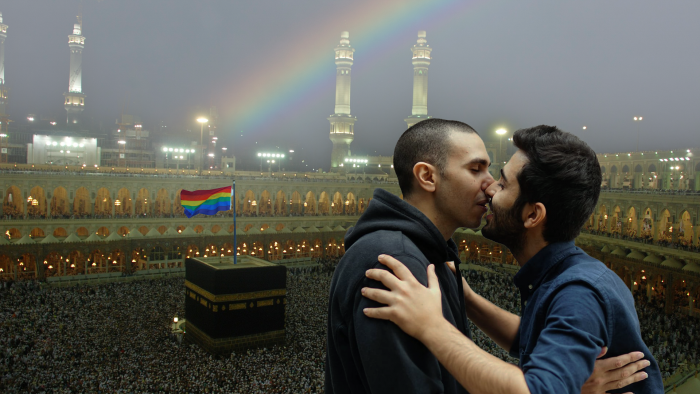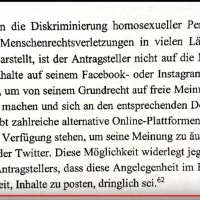A Victory for Freedom of Opinion
Amed Sherwan wins lawsuit against Facebook/Instagram
Yesterday's ruling by the Flensburg Regional Court in the legal dispute between Amed Sherwan and "Facebook Limited" sends a clear signal for freedom of opinion and against the unauthorized deletion of content on Instagram and Facebook. "Apparent" violations of the "community rules" are not sufficient, according to the judges, to delete posts or deactivate profiles. A decision with far-reaching consequences.
The legal dispute was triggered by a series of photos showing an insinuated kiss between Amed Sherwan and the Egyptian atheist Mohamed Hisham in front of various backgrounds, such as St. Peter's Square in Rome or the Kaaba in Mecca. While the other motifs tended to provoke amusement, the picture in front of the Kaaba caused a huge shitstorm, with numerous critics even resorting to open death threats. These threats were not deleted, however, but rather Ahmed Sherwan's Instagram profile was blocked, as was his Facebook account temporarily.
After being unblocked on Facebook, one of his Facebook posts addressing the debate was no longer visible because it allegedly violated "community standards." Amed Sherwan had ironically told his "Pakastani brothers" who threatened him that they had to learn to "deal with love in all its colorful varieties" and that "even Allah" could not "hack" his account. Against this, on December 31, 2020, Sherwan requested Facebook Ltd. to issue a cease-and-desist declaration with a penalty clause. Since the company refused to sign the cease-and-desist declaration, the legal dispute ensued, which ended with the remarkable decision of the Flensburg Regional Court on March 17.
Is Facebook homophobic?
The extent to which Facebook resisted the cease-and-desist declaration is shown by the fact that Facebook Ltd.'s statement of defense, including all attachments, ran to well over 2,000 pages. Attorney Joachim Steinhöfel, who represented Amed Sherwan in court, was not impressed by this, but instead went on the offensive. In a video titled "Ist Facebook homophob?" ("Is Facebook homophobic?") which he published on YouTube on the eve of the trial, Steinhöfel made public that Facebook had caved in to militant Islamists and that the deletions were inadmissible because of the "apparent" presence of a fake account or "apparent" hate speech.
Steinhöfel paid particular attention to marginal note 111 of the statement of defense (see screenshot in the image gallery), in which Facebook LtD.'s lawyers state that human rights violations against homosexuals are a "serious problem," but that activists do not depend on articulating this on Facebook or Instagram, as there are numerous "alternative online platforms" for this purpose. Essentially, Facebook is saying, as Joachim Steinhöfel elaborates in his video: "Get lost! Do your gay stuff on YouTube or Twitter, please! - This really makes you speechless in all its arrogance and double standards!"
Fortunately, the Flensburg judges shared Steinhöfel's assessment and ordered Facebook to pay the costs of the proceedings. The judges reprimanded Facebook for not acknowledging its misjudgment and for continuing to insist on its opinion. It is clear after the decision, however, that "apparent" violations of community rules are by no means sufficient to delete content or deactivate profiles on social media platforms. This puts a stop - at least in the jurisdiction of the deciding court - to Facebook/Instagram's previous deletion-friendly practice. Comparable rulings have now also been issued by other regional and higher regional courts.
Misguided priorities
The Giordano Bruno Foundation and the Institute for Secular Law (ifw) have supported Amed Sherwan's legal dispute and, along with the "Initiative für Meinungsfreiheit im Netz" (Initiative for Freedom of Expression on the Web), have assumed a significant portion of the costs in order to thwart a dangerous development. For some time now, Islamist networks have been trying to silence critical voices on social networks. This includes not only death threats and insults, but also targeted and orchestrated reporting campaigns that lead to the suspension of profiles. This particularly affects accounts of ex-Muslims and critics of Islam.
Last but not least, the Network Enforcement Act (NetzDG) introduced by the CDU/CSU and SPD in 2017 should also be criticized in this context. In this regard, the 2018 gbs brochure "How should. IT work? Defending human rights in the age of digitalization": "The state must and must only intervene where laws are clearly broken and personal rights are violated. This is the basic prerequisite of any liberal constitutional state: In an open society, it is not freedom that needs to be justified, but any restriction of freedom."
The gbs therefore advocates revising the Network Enforcement Act to ensure that overzealous deletion or blocking of legally compliant content is punished with penalties just as severe as those for failing to delete or block illegal content: "After all, as long as social media platform operators are held accountable only for not deleting enough, there is an incentive to give 'the benefit of the doubt against the accused,' which runs counter to any sound legal practice and the principles of open society."
Links to this story:
- Niederlage für Facebook: Internet-Riese muss gegen Blogger klein beigeben (SHZ, 17.3.2021)
- Ein Kuss ist kein Verbrechen! (hpd, 18.3.2021)
- Flüchtling zieht gegen Facebook vor Gericht (BILD, 21.3.2021)






